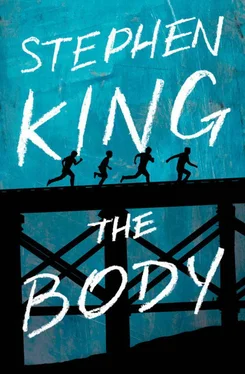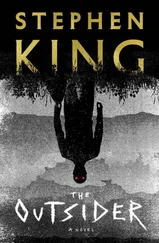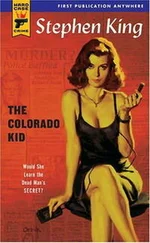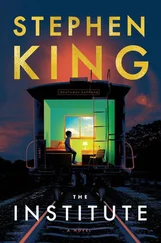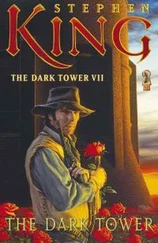The most important things are the hardest things to say. They are the things you get ashamed of, because words diminish them—words shrink things that seemed limitless when they were in your head to no more than living size when they’re brought out. But it’s more than that, isn’t it? The most important things lie too close to wherever your secret heart is buried, like landmarks to a treasure your enemies would love to steal away. And you may make revelations that cost you dearly only to have people look at you in a funny way, not understanding what you’ve said at all, or why you thought it was so important that you almost cried while you were saying it. That’s the worst, I think. When the secret stays locked within not for want of a teller but for want of an understanding ear.
I was twelve going on thirteen when I first saw a dead human being. It happened in I960, a long time ago… although sometimes it doesn’t seem that long to me. Especially on the nights I wake up from dreams where the hail falls into his open eyes.
We had a treehouse in a big elm which overhung a vacant lot in Castle Rock. There’s a moving company on that lot today, and the elm is gone. Progress. It was a sort of social club, although it had no name. There were five, maybe six steady guys and some other wet ends who just hung around. We’d let them come up when there was a card game and we needed some fresh blood. The game was usually blackjack and we played for pennies, nickel limit. But you got double money on blackjack and five-card-under… triple money on six-card-under, although Teddy was the only guy crazy enough to go for that.
The sides of the treehouse were planks scavenged from the shitpile behind Mackey Lumber & Building Supply on Carbine Road—they were splintery and full of knotholes we plugged with either toilet paper or paper towels. The roof was a corrugated tin sheet we hawked from the dump, looking over our shoulders all the time we were hustling it out of there, because the dump custodian’s dog was supposed to be a real kid-eating monster. We found a screen door out there on the same day. It was flyproof but really rusty—I mean, that rust was extreme. No matter what time of day you looked out that screen door, it looked like sunset.
Besides playing cards, the club was a good place to go and smoke cigarettes and look at girly books. There were half a dozen battered tin ashtrays that said camels on the bottom, a lot of centerfolds tacked to the splintery walls, twenty or thirty dog-eared packs of Bike cards (Teddy got them from his uncle, who ran the Castle Rock Stationery Shoppe—when Teddy’s unc asked him one day what kind of cards we played, Teddy said we had cribbage tournaments and Teddy’s unc thought that was just fine), a set of plastic poker chips, and a pile of ancient Master Detective murder magazines to leaf through if there was nothing else shaking. We also built a 12" x 10" secret compartment under the floor to hide most of this stuff in on the rare occasions when some kid’s father decided it was time to do the we’re-really-good-pals routine. When it rained, being in the club was like being inside a Jamaican steel drum… but that summer there had been no rain.
It had been the driest and hottest since 1907—or so the newspapers said, and on that Friday preceding the Labor Day weekend and the start of another school year, even the goldenrod in the fields and the ditches beside the backroads looked parched and poorly. Nobody’s garden had done doodly-squat that year, and the big displays of canning stuff in the Castle Rock Red & White were still there, gathering dust. No one had anything to put up that summer, except maybe dandelion wine.
Teddy and Chris and I were up in the club on that Friday morning, glooming to each other about school being so near and playing cards and swapping the same old traveling salesman jokes and frenchman jokes. How do you know when a frenchman’s been in your back yard? Well, your garbage cans are empty and your dog is pregnant. Teddy would try to look offended, but he was the first one to bring in a joke as soon as he heard it, only switching frenchman to polack.
The elm gave good shade, but we already had our shirts off so we wouldn’t sweat them up too bad. We were playing three-penny-scat, the dullest card-game ever invented, but it was too hot to think about anything more complicated. We’d had a pretty fair scratch ballteam until the middle of August and then a lot of kids just drifted away. Too hot.
I was down to my ride and building spades. I’d started with thirteen, gotten an eight to make twenty-one, and nothing had happened since then. Chris knocked. I took my last draw and got nothing helpful.
“Twenty-nine,” Chris said, laying down diamonds.
“Twenty-two,” Teddy said, looking disgusted.
“Piss up a rope,” I said, and tossed my cards onto the table face down.
“Gordie’s out, ole Gordie just bit the bag and stepped out the door,” Teddy bugled, and then gave out with his patented Teddy Duchamp laugh— Eeee-eee-eee, like a rusty nail being slowly hauled out of a rotten board. Well, he was weird; we all knew it. He was close to being thirteen like the rest of us, but the thick glasses and the hearing aid he wore sometimes made him look like an old man. Kids were always trying to cadge smokes off him on the street, but the bugle in his shirt was just his hearing-aid battery.
In spite of the glasses and the flesh-colored button always screwed into his ear, Teddy couldn’t see very well and often misunderstood the things people said to him. In baseball you had to have him play the fences, way beyond Chris in left field and Billy Greer in right. You just hoped no one would hit one that far because Teddy would go grimly after it, see it or not. Every now and then he got bonked a good one, and once he went out cold when he ran full-tilt-boogie into the fence by the treehouse. He lay there on his back with his eyes showing whites for almost five minutes, and I got scared. Then he woke up and walked around with a bloody nose and a huge purple lump rising on his forehead, trying to claim that the ball was foul.
His eyesight was just naturally bad, but there was nothing natural about what had happened to his ears. Back in those days, when it was cool to get your hair cut so that your ears stuck out like a couple of jug-handles, Teddy had Castle Rock’s first Beatle haircut—four years before anyone in America had ever heard of the Beatles. He kept his ears covered because they looked like two lumps of warm wax.
One day when he was eight, Teddy’s father got pissed at him for breaking a plate. His mother was working at the shoe factory in South Paris when it happened and by the time she found out about it, it was all over.
Teddy’s dad took Teddy over to the big woodstove at the back of the kitchen and shoved the side of Teddy’s head down against one of the cast-iron burner plates. He held it down there for about ten seconds. Then he yanked Teddy up by the hair of the head and did the other side. Then he called the Central Main General Emergency unit and told them to come get his boy. Then he hung up the phone, went into the closet, got his .410, and sat down to watch the daytime stories on TV with the shotgun laid across his knees. When Mrs. Burroughs from next door came over to ask if Teddy was all right—she’d heard the screaming—Teddy’s dad pointed the shotgun at her. Mrs. Burroughs went out of the Duchamp house at roughly the speed of light, locked herself into her own house, and called the police. When the ambulance came, Mr. Duchamp let the orderlies in and then went out on the back porch to stand guard while they wheeled Teddy to the old portholed Buick ambulance on a stretcher.
Читать дальше
